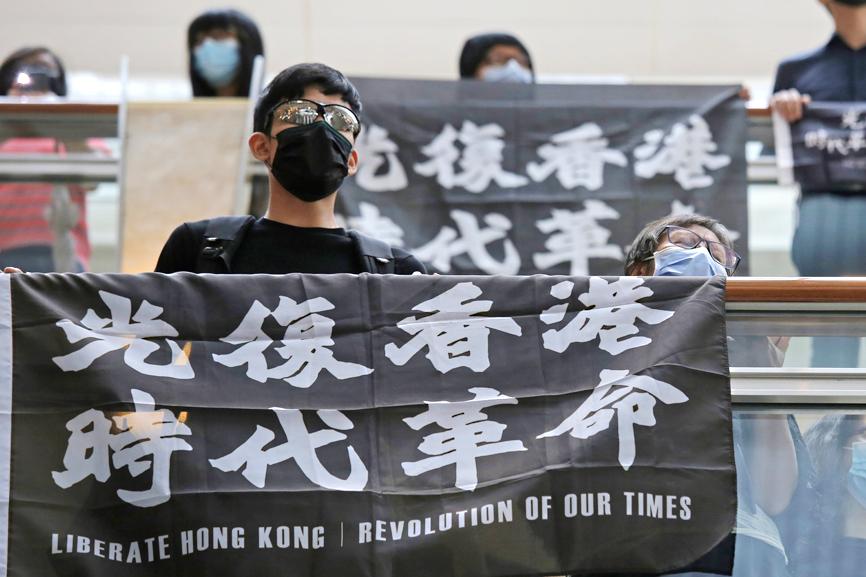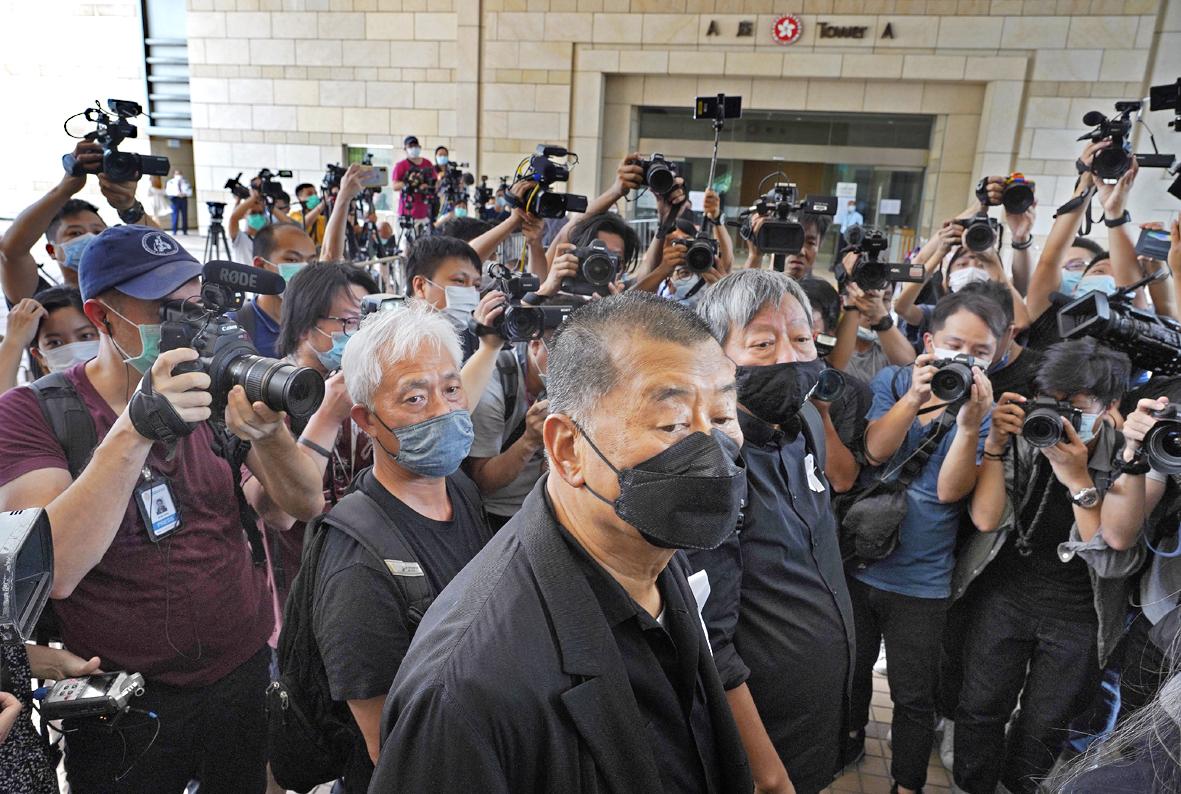The new national security legislation China is imposing on Hong Kong could be used against journalists operating in Asia’s main financial hub, which maintains distinct freedoms from the mainland, a global media watchdog group said.
Reporters Without Borders said Beijing’s move to bypass Hong Kong’s legislature and force new laws banning terrorism, secession, subversion and foreign interference could result in journalists facing the same type of intimidation and criminal prosecution that they encounter in mainland China.
“Such regulation would give the Chinese regime the means to harass and punish any journalist they dislike in Hong Kong with the appearance of legality,” said Cedric Alviani, the group’s East Asia director. “The vast majority of the 114 journalists currently detained in China are imprisoned under allegations of national security-related crimes.”

Photo: AP
Hong Kong’s government has said the new legislation is aimed only at a small number of criminals and that it won’t target law-abiding citizens or harm the unique freedoms guaranteed in the city’s mini-constitution, the Basic Law, which specifies residents will enjoy “freedom of speech, of the press and of publication.”
The group’s concerns about eroding media freedoms in the semi-autonomous city echo fears expressed by other civil society groups that China’s move to introduce the new laws is part of a broader campaign to quash dissent after unprecedented and sometimes violent unrest last year.
This week, a group of 86 organizations including Human Rights Watch and Amnesty International issued a statement calling the new laws “a devastating assault on human rights” that should be abandoned. The Hong Kong Journalists Association said a survey of members revealed 98 percent disagreed with the laws.

Photo: AP
Reporters Without Borders — known by its French acronym RSF — had previously said the new laws “will make it easier for the authoritarian Chinese regime to trample on rights, including press freedom, that are supposed to be guaranteed in the former British colony under the ‘one country, two systems’ principle until 2047.”
PRESS FREEDOM
The more specific concerns about the potential threats to journalists also come amid longer-standing concerns about the ability of media workers to operate freely in Hong Kong, which is the regional base for many international news organizations.
Chief Executive Carrie Lam in April backed a city agency’s criticism of public broadcaster Radio Television Hong Kong for questioning Taiwan’s exclusion from world health bodies, a move that followed an earlier critique by pro-Beijing groups of one of the network’s political satire shows.
A month earlier, as part of broader tit-for-tat retaliation between the US and China, Beijing kicked out a group of American correspondents based in the Chinese capital and specified that none of them would be able to take up work in Hong Kong — which is supposed to have a separate immigration system.
The move prompted Hong Kong’s Foreign Correspondents’ Club to question whether the city still had control of its immigration policy, saying in a statement that any change would mark “a serious erosion” of the “one country, two systems” principle by which China governs the city.
Two years ago, Hong Kong denied a visa renewal for Financial Times journalist Victor Mallet after he hosted an event at the club featuring the founder of a banned pro-independence party.
RSF on Friday detailed how China uses existing laws barring terrorism, secession, subversion and foreign interference to go after journalists.
With no details on the news laws yet available, the group said local journalists in Hong Kong could conceivably be accused of terrorism for reporting from the scene of a violent protest, of secession for writing about Hong Kong’s independence movement or of subversion for running an anti-government opinion piece.
Foreign correspondents or employees of foreign outlets, meanwhile, could also be accused of interference by foreign powers, the group said.

Towering high above Taiwan’s capital city at 508 meters, Taipei 101 dominates the skyline. The earthquake-proof skyscraper of steel and glass has captured the imagination of professional rock climber Alex Honnold for more than a decade. Tomorrow morning, he will climb it in his signature free solo style — without ropes or protective equipment. And Netflix will broadcast it — live. The event’s announcement has drawn both excitement and trepidation, as well as some concerns over the ethical implications of attempting such a high-risk endeavor on live broadcast. Many have questioned Honnold’s desire to continues his free-solo climbs now that he’s a

As Taiwan’s second most populous city, Taichung looms large in the electoral map. Taiwanese political commentators describe it — along with neighboring Changhua County — as Taiwan’s “swing states” (搖擺州), which is a curious direct borrowing from American election terminology. In the early post-Martial Law era, Taichung was referred to as a “desert of democracy” because while the Democratic Progressive Party (DPP) was winning elections in the north and south, Taichung remained staunchly loyal to the Chinese Nationalist Party (KMT). That changed over time, but in both Changhua and Taichung, the DPP still suffers from a “one-term curse,” with the

Lines between cop and criminal get murky in Joe Carnahan’s The Rip, a crime thriller set across one foggy Miami night, starring Matt Damon and Ben Affleck. Damon and Affleck, of course, are so closely associated with Boston — most recently they produced the 2024 heist movie The Instigators there — that a detour to South Florida puts them, a little awkwardly, in an entirely different movie landscape. This is Miami Vice territory or Elmore Leonard Land, not Southie or The Town. In The Rip, they play Miami narcotics officers who come upon a cartel stash house that Lt. Dane Dumars (Damon)

Today Taiwanese accept as legitimate government control of many aspects of land use. That legitimacy hides in plain sight the way the system of authoritarian land grabs that favored big firms in the developmentalist era has given way to a government land grab system that favors big developers in the modern democratic era. Articles 142 and 143 of the Republic of China (ROC) Constitution form the basis of that control. They incorporate the thinking of Sun Yat-sen (孫逸仙) in considering the problems of land in China. Article 143 states: “All land within the territory of the Republic of China shall